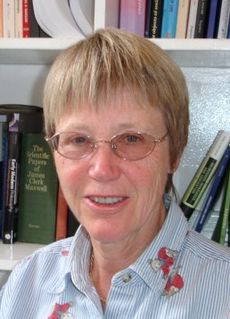Related Research Articles

Metaphysics is the branch of philosophy that studies the fundamental nature of reality, the first principles of being, identity and change, space and time, causality, necessity, and possibility. It includes questions about the nature of consciousness and the relationship between mind and matter, between substance and attribute, and between potentiality and actuality. The word "metaphysics" comes from two Greek words that, together, literally mean "after or behind or among [the study of] the natural". It has been suggested that the term might have been coined by a first century CE editor who assembled various small selections of Aristotle's works into the treatise we now know by the name Metaphysics.
Postmodern philosophy is a philosophical movement that arose in the second half of the 20th century as a critical response to assumptions allegedly present in modernist philosophical ideas regarding culture, identity, history, or language that were developed during the 18th-century Enlightenment. Postmodernist thinkers developed concepts like difference, repetition, trace, and hyperreality to subvert "grand narratives", univocity of being, and epistemic certainty. Postmodern philosophy questions the importance of power relationships, personalization, and discourse in the "construction" of truth and world views. Many postmodernists appear to deny that an objective reality exists, and appear to deny that there are objective moral values.

Philosophy of science is a branch of philosophy concerned with the foundations, methods, and implications of science. The central questions of this study concern what qualifies as science, the reliability of scientific theories, and the ultimate purpose of science. This discipline overlaps with metaphysics, ontology, and epistemology, for example, when it explores the relationship between science and truth. Philosophy of science focuses on metaphysical, epistemic and semantic aspects of science. Ethical issues such as bioethics and scientific misconduct are often considered ethics or science studies rather than the philosophy of science.

Reductionism is any of several related philosophical ideas regarding the associations between phenomena, which can be described in terms of other simpler or more fundamental phenomena. It is also described as an intellectual and philosophical position that interprets a complex system as the sum of its parts.

Mario Augusto Bunge was an Argentine-Canadian philosopher and physicist. His philosophical writings combined scientific realism, systemism, materialism, emergentism, and other principles.
Pluralism is a term used in philosophy, meaning "doctrine of multiplicity," often used in opposition to monism and dualism. The term has different meanings in metaphysics, ontology, epistemology and logic.

Ian MacDougall Hacking is a Canadian philosopher specializing in the philosophy of science. Throughout his career, he has won numerous awards, such as the Killam Prize for the Humanities and the Balzan Prize, and been a member of many prestigious groups, including the Order of Canada, the Royal Society of Canada and the British Academy.
Neurophenomenology refers to a scientific research program aimed to address the hard problem of consciousness in a pragmatic way. It combines neuroscience with phenomenology in order to study experience, mind, and consciousness with an emphasis on the embodied condition of the human mind. The field is very much linked to fields such as neuropsychology, neuroanthropology and behavioral neuroscience and the study of phenomenology in psychology.

Against Method: Outline of an Anarchistic Theory of Knowledge is a 1975 book by Austrian-born philosopher of science Paul Feyerabend. The author argues that science should become an anarchic enterprise, not a nomic (customary) one; in the context of the work, the term "anarchy" refers to epistemological anarchy, which does not remain within one single prescriptive scientific method on the grounds that any such method would restrict scientific progress.

Philosophy and economics studies topics such as public economics, behavioural economics, rationality, justice, history of economic thought, rational choice, the appraisal of economic outcomes, institutions and processes, the status of highly idealized economic models, the ontology of economic phenomena and the possibilities of acquiring knowledge of them.

Nancy Cartwright, Lady Hampshire, is an American philosopher of science. She is a professor of philosophy at the University of California at San Diego and the University of Durham. Currently, she is the President of the Division for Logic, Methodology and Philosophy of Science and Technology of the International Union of History and Philosophy of Science and Technology.
Neopragmatism, sometimes called post-Deweyan pragmatism, linguistic pragmatism, or analytic pragmatism, is the philosophical tradition that infers that the meaning of words is a result of how they are used, rather than the objects they represent.
The unity of science is a thesis in philosophy of science that says that all the sciences form a unified whole.

Helen Elizabeth Longino is an American philosopher of science who has argued for the significance of values and social interactions to scientific inquiry. She has written about the role of women in science and is a central figure in feminist epistemology and social epistemology. She is the Clarence Irving Lewis Professor of Philosophy at Stanford University. In 2016, she was elected to the American Academy of Arts and Sciences.
Alison Wylie is a Canadian philosopher of archaeology. She is a professor of philosophy at the University of British Columbia and holds a Canada Research Chair in Philosophy of the Social and Historical Sciences.
Scientific pluralism is a position within the philosophy of science that rejects various proposed unities of scientific method and subject matter. Scientific pluralists hold that science is not unified in one or more of the following ways: the metaphysics of its subject matter, the epistemology of scientific knowledge, or the research methods and models that should be used. Some pluralists believe that pluralism is necessary due to the nature of science. Others say that since scientific disciplines already vary in practice, there is no reason to believe this variation is wrong until a specific unification is empirically proven. Finally, some hold that pluralism should be allowed for normative reasons, even if unity were possible in theory.
John A. Dupré is a British philosopher of science. He is the director of Egenis, the Centre for the Study of Life Sciences, and professor of philosophy at the University of Exeter. Dupré's chief work area lies in philosophy of biology, philosophy of the social sciences, and general philosophy of science. Dupré, together with Nancy Cartwright, Ian Hacking, Patrick Suppes and Peter Galison, are often grouped together as the "Stanford School" of philosophy of science.
Epistemological pluralism is a term used in philosophy, economics, and virtually any field of study to refer to different ways of knowing things, different epistemological methodologies for attaining a fuller description of a particular field. A particular form of epistemological pluralism is dualism, for example, the separation of methods for investigating mind from those appropriate to matter. By contrast, monism is the restriction to a single approach, for example, reductionism, which asserts the study of all phenomena can be seen as finding relations to some few basic entities.
In philosophy, naturalism is the idea or belief that only natural laws and forces operate in the universe.
Naturalism is not so much a special system as a point of view or tendency common to a number of philosophical and religious systems; not so much a well-defined set of positive and negative doctrines as an attitude or spirit pervading and influencing many doctrines. As the name implies, this tendency consists essentially in looking upon nature as the one original and fundamental source of all that exists, and in attempting to explain everything in terms of nature. Either the limits of nature are also the limits of existing reality, or at least the first cause, if its existence is found necessary, has nothing to do with the working of natural agencies. All events, therefore, find their adequate explanation within nature itself. But, as the terms nature and natural are themselves used in more than one sense, the term naturalism is also far from having one fixed meaning.

Hasok Chang is a Korean-born American historian and philosopher of science currently serving as the Hans Rausing Professor at the Department of History and Philosophy of Science at the University of Cambridge and a board member of the Philosophy of Science Association. He previously served as president of the British Society for the History of Science from 2012 to 2014.
References
- 1 2 Scerri, Eric (2000). "The Failure of Reduction and How to Resist the Disunity of Science in Chemical Education". Science and Education. 9 (5): 405–425. doi:10.1023/A:1008719726538. S2CID 142778705.
- 1 2 Cat, Jordi. "The Unity of Science". Stanford Encyclopedia of Philosophy. Retrieved 8 July 2012.
- ↑ Newall, Paul. "John Dupré: The Disunity of Science". The Galilean. Archived from the original on 6 April 2008. Retrieved 8 July 2012.
- ↑ The "Stanford School" of Philosophy of Science conference, "The "Stanford School" of Philosophy of Science, Day 1 October 25, 2013". Archived from the original on 2013-08-13. Retrieved 2013-08-13.